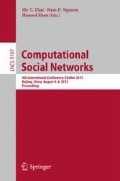Abstract
Recent years have seen exponential growth of microblog which provides users with a new communication and information sharing platform. Some recommendation approaches have been proposed by leveraging the social relationships in microblog based on the principle of homophily to improve the accuracy of recommendation. To prove the feasibility of users social relationships as the bases of recommendation in microblog, we investigate the correlation of strength of social relationship and user interest similarity in microblog by using real-world data set. We observe that strength of social relationship shows strong positive correlation with user interest similarity in microblog. We believe our investigation presents substantial impact for social recommendation research in microblog and will benefit future research in both recommender systems and other related social implications.
Access this chapter
Tax calculation will be finalised at checkout
Purchases are for personal use only
Preview
Unable to display preview. Download preview PDF.
References
Yang, X., Guo, Y., Liu, Y., Steck, H.: A Survey of Collaborative Filtering Based Social Recommender Systems. Computer Communications 41, 1–10 (2014)
McPherson, M., Smith-Lovin, L., Cook, J.M.: Birds of a Feather: Homophily in Social Networks. Annual Review of Sociology 27, 415–444 (2001)
Lin, J., Sugiyama, K., Kan, M.Y., Chua, T.S.: Addressing cold-start in app recommen-dation: latent user models constructed from twitter followers. In: Procedings of the 36th International ACM SIGIR Conference on Research and Development in Information Retrieval, pp. 283–292. ACM Press, New York (2013)
Ting, I.H., Chang, P.S., Wang, S.L.: Understanding Microblog Users for Social Recom-mendation Based on Social Networks Analysis. Journal of Universal Computer Science 18, 554–576 (2012)
Yamaguchi, Y., Amagasa, T., Kitagawa, H.: Recommending fresh URLs using twitter list. In: Proceedings of the Seventh International AAAI Conference on Weblogs and Social Media, pp. 733–736. AAAI Publication, New York (2013)
Yu, Y., Wang, X.: Link Prediction in Directed Network and Its Application in Microblog. Mathematical Problems in Engineering 2014, 1–9 (2014)
Yu, Y., Qiu, R.G.: Followee Recommendation in Microblog Using Matrix Factorization Model with Structural Regularization. The Scientific World Journal 2014, 1–11 (2014)
Ziegler, C.N., Golbeck, J.: Investigating Interactions of Trust and Interest Similarity. Decision Support System 43, 460–475 (2007)
Lee, D., Brusilovsky, P.: Does trust influence information similarity? In: Proceedings of the ACM RecSys09 Workshop on Recommender System and the Social Web, pp. 71–74. ACM Press, New York (2009)
Ma, H.: On measuring social friend interest similarities in recommender system. In: Proceedings of the 37th International ACM SIGIR Conference on Research and Develop-ment in information Retrieval, pp. 465–474. ACM Press, New York (2014)
Gilbert, E., Karahalios, K.: Predicting tie strength with social media. In: Proceedings of the 27th International Conference on Human Factors in Computing Systems, pp. 211–220. ACM Press, New York (2009)
Petróczi, A., Nepusz, T., Bazsó, F.: Measuring Tie-strength in Virtual Social Networks. Connections 27, 39–52 (2006)
Xiang, R., Neville, J., Rogati, M.: Modeling relationship strength in online social net-works. In: Proceedings of the 19th International Conference on World Wide Web, pp. 981–990. ACM Press, New York (2010)
Granovetter, M.S.: The Strength of Weak Ties. The American Journal of Sociology 78, 1360–1380 (1973)
Yin, D., Hong, L., Davison, B.D.: Structural link analysis and prediction in microblogs. In: Proceedings of the 20th ACM International Conference on Information and Knowledge Management, pp. 1163–1168. ACM Press, New York (2011)
Java, A., Song, X., Finin, T., Tseng, B.: Why we twitter: understanding microblogging usage and communities. In: Proceedings of the 9th WebKDD and 1st SNA-KDD 2007 Workshop on Web Mining and Social Network Analysis, pp. 56–65. ACM Press, New York (2007)
Krishnamurthy, B., Gill, P., Arlitt, M.: A few chirps about twitter. In: Proceedings of the 1st Workshop on Online Socail Networks, pp. 19–24. ACM Press, New York (2008)
Kwak, H., Lee, C., Park, H., Moon, S.: What is twitter, a social network or a news media? In: Proceedings of the 19th International Conference on World Wide Web, pp. 591–600. ACM Press, New York (2010)
Wilson, C., Boe, B., Sala, A., Puttaswamy, K.P., Zhao, B.Y.: User interactions in social networks and their implications. In: Proceedings of the 4th ACM European Conference on Computer Systems, pp. 205–218. ACM Press, New York (2009)
Wilson, M., Nicholas, C.: Topological analysis of an online social network for older adults. In: Proceeding of the 2008 ACM Workshop on Search in Social Media, pp. 51–58. ACM Press, New York (2008)
Zhou, Y., Chen, K., Song, L., Yang, X., He, J.: Feature analysis of spammers in social networks with active honeypots: a case study of chinese microblogging networks. In: 2012 IEEE/ACM International Conference on Advances in Social Networks Analysis and Mining, pp. 728–729. IEEE Computer Society, Washington D.C. (2012)
Golder, S.A., Yardi, S.: Structural predictors of tie formation in twitter transitivity and mutuality. In: 2010 IEEE Second International Conference on Social Computing, pp. 88–95. IEEE Press, New York (2010)
Author information
Authors and Affiliations
Corresponding author
Editor information
Editors and Affiliations
Rights and permissions
Copyright information
© 2015 Springer International Publishing Switzerland
About this paper
Cite this paper
Yu, Y., Mo, L. (2015). Investigating Correlation Between Strength of Social Relationship and Interest Similarity. In: Thai, M., Nguyen, N., Shen, H. (eds) Computational Social Networks. CSoNet 2015. Lecture Notes in Computer Science(), vol 9197. Springer, Cham. https://doi.org/10.1007/978-3-319-21786-4_15
Download citation
DOI: https://doi.org/10.1007/978-3-319-21786-4_15
Published:
Publisher Name: Springer, Cham
Print ISBN: 978-3-319-21785-7
Online ISBN: 978-3-319-21786-4
eBook Packages: Computer ScienceComputer Science (R0)

